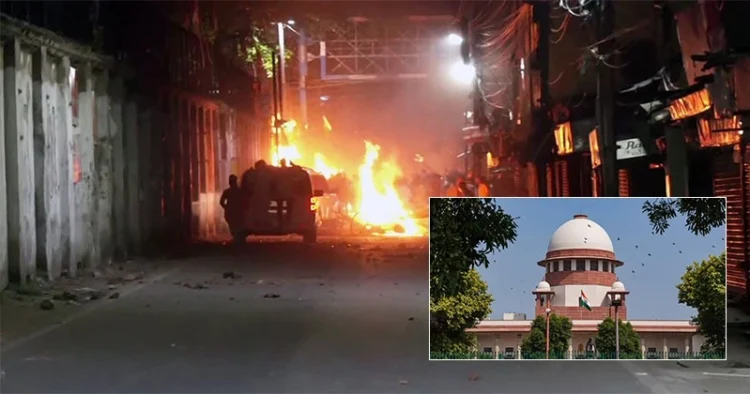On July 24, the Supreme Court of India dismissed West Bengal Government’s petition challenging Calcutta High Court’s April 27 order transferring the probe into the cases concerning the Ram Navami violence to the National Investigation Agency (NIA).
The court’s three-judge bench, comprising Chief Justice DY Chandrachud, Justice JB Pardiwala and Justice Manoj Misra, noted that the Government of India had exercised its suo motu powers u/s 6(5) of the NIA Act to direct the NIA to investigate these cases. The court also noted that the West Bengal Government had not challenged the Government of India’s notification.
The court noted that the provisions of the NIA Act mandate that a police officer inform the State Government about the occurrence of any scheduled offence and that the State Government is obliged to forward the same to the Government of India. However, the court observed that the Government of India’s power to refer cases to NIA is not constrained by the State Government’s report.
“The precise contours of investigation which should be carried by NIA cannot be anticipated at this stage. In this backdrop, and particularly in absence of challenge to notification, we are not inclined to entertain the SLP. We clarify that the observations made by HC be confined to question of whether NIA had jurisdiction to probe,” the court said.
The Calcutta High Court, in its April 27 order, observed that explosives were used during the Ram Navami incidents and thus, the matter travelled beyond the scope of state police. The court noted that as the use of petrol bombs and acid bottles fell under scheduled offences, the case was fit to be investigated by the NIA.
The high court also noted that despite the occurrence of scheduled offences, no cases were registered under such acts. “It raises a series doubt in our minds as to whether this was a deliberate attempt by the investigating police fighting shy of resorting to the procedure required to be complied with under Section 6(1) of the NIA Act,” the court said.
Calcutta High Court Transfers Ram Navami Violence Probe to NIA
On April 27, the Calcutta High Court transferred the probe, and directed the West Bengal Police to hand over all documents including FIRs, case papers, seized materials, footage, etc concerning the violence which occurred during Ram Navami celebrations in the state to the NIA.
The Calcutta High Court said, “We are convinced that no useful purpose would be served by directing the State Police to register cases against those, who used acid bottles and petrol bombs etc under the Explosive Substances Act as the matter has travelled beyond that stage and it is fit case to transfer the investigation to the NIA.”
The Calcutta High Court said, “…it is evidently clear that despite the offences being committed under the Act mentioned in the schedule to the NIA Act, no case has been registered under the provisions of such Act. It raises a series doubt in our minds as to whether this was a deliberate attempt by the investigating police fighting shy of resorting to the procedure required to be complied with under Section 6(1) of the NIA Act.”
The Calcutta High Court said that the state police has underplayed the true state of affairs as the police has been directed to transfer the probe to the NIA in more than 8 cases. The Calcutta High Court said, “the state police having been directed by this Court in more than 8 orders to transfer the matter to the NIA, in the present incidents they have under played the true state of affairs which in our view should not be permitted.”
Furthermore, the Calcutta High Court said that it prima-facie found that there was a deliberate attempt of the police to not register offences under Explosive Substances Act. The Calcutta High Court said, “we prima facie find that there has been a deliberate attempt on the part of the concerned police not to register any offence under the provisions of the Explosives Substances Act. There is also mention about the acid bottles and if be so, necessarily offence under the scheduled Act having been committed, the procedure under Section 6(1) of the NIA Act should have been resorted to.”
The Calcutta High Court concluded, “In the result, the writ petitions are disposed of by directing the concerned police to ensure that all the FIRs, documents, materials seized, CCTV footage etc. be immediately handed over to the appropriate authority of the National Investigation Agency who on receipt of all the entire materials shall commence investigation and proceed in accordance with law.” Furthermore, the Calcutta High Court stated that the police shall hand over the materials to the NIA within a period of two weeks from the order’s date.




















Comments